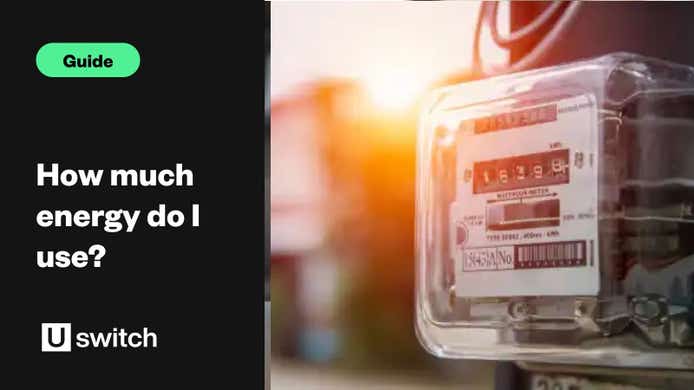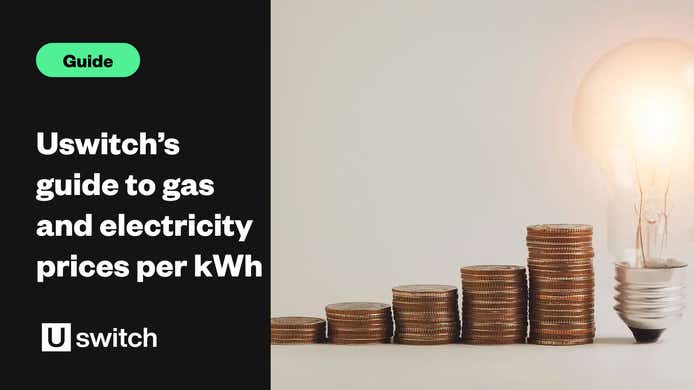With energy prices still high, there are fixed energy deals available from various suppliers that will save you money if you're on a standard variable deal.
There are also some practical things you can do at home to use less energy, help the environment and save money on your bills.
Our Power House report will show you how much energy your everyday appliances use to help you see if you can run your home more efficiently.
Not only have we collated a table below which lists the cost of different appliances in each room using their average power rating but we have also created the ‘Uswitch cost of running household appliances calculator’ to make it even easier to see which appliances and rooms in your home are costing you the most.
All costs are based on the average unit rates according to the current energy price cap.
Cost of running household appliances calculator
Our handy tool helps you calculate the cost of running household appliances in each room of your home.
Simply select the different appliances and how long you use them and the calculator will provide an estimated individual appliance and total cost, broken down room by room.
Using the cost of running household appliances calculator, you can see how making small changes to how you use household appliances can affect your energy costs.
The table below lists the cost of different appliances in each room using their average power rating and the costs are based on the average unit rates according to the energy price cap, which is set at £1,720 until 30 September 2025.
Which kitchen appliances use the most energy?
We tend to spend most of our time in the kitchen, so a lot of a household’s energy usage is going to come from the various appliances used in cooking or storing food. According to the data, using the hob is likely to cost the most money at £81.25 per year. Freezers are more expensive to use than fridges (at £71.79 and £42.71 per year respectively), while the lowest-cost appliance is an ice cream maker, which uses 0.035 kWh and costs 47p per year.
| Device | Av. minutes used per week | Cost per hour/cycle | Cost per week per household | Cost per year per household |
|---|---|---|---|---|
| Air fryer | 102 | £0.36 | £0.61 | £31.84 |
| Breadmaker | 78 | £0.14 | £0.18 | £9.57 |
| Coffee maker | 60 | £0.32 | £0.32 | £16.72 |
| Dishwasher | 210 | £0.20 | £0.71 | £36.99 |
| Electric blender/juicer | 31.9 | £0.18 | £0.10 | £4.98 |
| Electric dryer / airer (heated drying rack) | 116.1 | £0.08 | £0.15 | £8.03 |
| Electric hob | 158.4 | £0.59 | £1.56 | £81.24 |
| Freezer | 10080 | £0.01 | £1.38 | £71.79 |
| Fridge | 10080 | £0.82 | £42.71 | |
| Fridge/freezer | 10080 | £0.00 | £1.21 | £63.17 |
| Heated clothes rack | 114 | £0.08 | £0.15 | £7.63 |
| Hob (average) | 150 | £0.93 | £1.54 | £79.89 |
| Ice cream maker | 42.6 | £0.01 | £0.01 | £0.47 |
| Iron | 52.2 | £0.80 | £0.69 | £36.08 |
| Kettle | 120 | £0.77 | £1.54 | £80.28 |
| Microwave | 96 | £0.26 | £0.41 | £21.41 |
| One gas hob | 151.4 | £0.00 | £0.00 | £0.16 |
| Oven (electric/fan) | 180 | £0.16 | £0.49 | £25.29 |
| Pressure cooker | 54 | £0.93 | £0.83 | £43.35 |
| Slow cooker | 108 | £0.08 | £0.15 | £7.71 |
| Steamer | 10 | £0.46 | £0.08 | £4.01 |
| Toastie maker | 32.2 | £0.26 | £0.14 | £7.18 |
| Tumble dryer | 150 | £0.92 | £2.89 | £150.19 |
| Vacuum cleaner | 69.1 | £0.04 | £0.04 | £2.31 |
| Washing machine | 210 | £0.18 | £0.64 | £33.34 |
Which living room appliances use the most energy?
As one of the most-used rooms in the house, living rooms account for a significant chunk of a home’s energy usage as well. According to the data, a built-in air conditioning system in the living room costs £122.82 each year. At the cheaper end of the scale - though they’re being increasingly passed over in favour of streaming - are DVD and Blu-Ray players, which cost around 21p per year.
| Device | Av. minutes used per week | Cost per hour/cycle | Cost per week per household | Cost per year per household |
|---|---|---|---|---|
| Amp | 171.5 | £0.04 | £0.11 | £5.74 |
| Built-in air con system | 204 | £0.70 | £2.36 | £122.82 |
| CD player | 101.7 | £0.00 | £0.00 | £0.23 |
| Computer and monitor | 373.7 | £0.02 | £0.10 | £5.42 |
| Dehumidifier | 180 | £0.09 | £0.27 | £14.05 |
| Desktop fan | 84 | £0.01 | £0.01 | £0.66 |
| DVD/blu-ray player | 93.1 | £0.00 | £0.00 | £0.21 |
| Electric dryer / airer (heated drying rack for clothes) | 116.1 | £0.08 | £0.15 | £8.03 |
| Electric lights | 140 | £0.03 | £0.08 | £3.90 |
| Fish tank (with filters & light) | 341.6 | £0.04 | £0.22 | £11.43 |
| Games console | 215.6 | £0.00 | £0.12 | £5.99 |
| Heated clothes rack | 114 | £0.08 | £0.15 | £7.63 |
| Internet router (Wi-Fi) | 486.4 | £0.00 | £0.32 | £16.63 |
| Lamp | 312.7 | £0.00 | £0.02 | £0.98 |
| Laptop | 331.6 | £0.03 | £0.13 | £6.69 |
| Phone charger | 235.3 | £0.00 | £0.00 | £0.19 |
| Plug-in electric heater | 60 | £0.52 | £0.51 | £26.76 |
| Portable air con unit | 72 | £0.26 | £0.31 | £16.06 |
| Record player | 79.5 | £0.00 | £0.00 | £0.18 |
| Smart speaker/Virtual home assistant (eg Alexa) | 145.7 | £0.00 | £0.01 | £0.49 |
| Speakers | 193.9 | £0.00 | £0.01 | £0.43 |
| TV | 451.5 | £0.03 | £0.20 | £10.26 |
| Virtual home assistant (eg Alexa) | 128.8 | £0.004 | £0.01 | £0.45 |
Which bedroom appliances use the most energy?
Air conditioning isn’t limited to the living room. When it comes to bedroom comfort, a built-in air conditioning system can be invaluable, especially during a heatwave, but during the winter, a plug-in electric heater, which costs £26.76 per year, can be equally useful in ensuring a comfortable night’s sleep.
| Device | Av. minutes used per week | Cost per hour/cycle | Cost per week per household | Cost per year per household |
|---|---|---|---|---|
| Amplifier | 95.2 | £0.04 | £0.06 | £3.18 |
| CD player | 101.7 | £0.00 | £0.00 | £0.23 |
| Computer and monitor | 373.7 | £0.02 | £0.10 | £5.42 |
| Desktop fan | 84 | £0.01 | £0.01 | £0.66 |
| DVD/blu-ray player | 93.1 | £0.00 | £0.00 | £0.21 |
| Electric blanket | 102 | £0.03 | £0.04 | £2.27 |
| Electric lights | 140 | £0.03 | £0.08 | £3.90 |
| Games console | 215.6 | £0.00 | £0.12 | £5.99 |
| Hair curlers/straighteners | 50.5 | £0.01 | £0.01 | £0.59 |
| Hair dryer | 43.9 | £0.46 | £0.34 | £17.62 |
| Lamp | 312.7 | £0.00 | £0.02 | £0.98 |
| Laptop | 331.6 | £0.03 | £0.13 | £6.69 |
| Phone charger | 277.9 | £0.00 | £0.11 | £5.62 |
| Plug-in electric heater | 60 | £0.52 | £0.51 | £26.76 |
| Portable air con unit | 72 | £0.26 | £0.31 | £16.06 |
| Record player | 79.5 | £0.00 | £0.00 | £0.18 |
| Speakers | 193.9 | £0.00 | £0.01 | £0.43 |
| TV | 389.9 | £0.03 | £0.16 | £8.43 |
Which bathroom appliances use the most energy?
In the bathroom, an electric shower uses the most energy according to the data - with an average use of 7.5 kWh, this translates into an average cost of £3.86 per week for UK households. Conversely, a gas shower costs £1.48 on average each week.
| Device | Av. minutes used per week | Cost per hour/cycle | Cost per week per household | Cost per year per household |
|---|---|---|---|---|
| Bath | 90 | £0.56 | £29.12 | |
| Electric razor | 39.3 | £0.01 | £0.01 | £0.35 |
| Electric toothbrush | 51.9 | £0.00 | £0.00 | £0.07 |
| Hair curlers/straighteners | 50.5 | £0.01 | £0.01 | £0.59 |
| Hair dryer | 43.9 | £0.46 | £0.34 | £17.62 |
| Shower (electric) | 120 | £1.93 | £3.86 | £200.69 |
| Shower (gas) | 120 | £1.48 | £76.96 |
Which garden appliances use the most energy?
Most people don’t necessarily think of gardens having appliances in the same way that kitchens and bathrooms do, but however a hot tub or a barbecue might be categorised, their energy cost is still something to be aware of. An electric barbecue uses 2.2 kWh, which costs the average household 91p per week or £45.28 per year. The cheapest garden appliance is a plug-in water feature, which has an average yearly cost of £1.30.
| Device | Av. minutes used per week | Cost per hour/cycle | Cost per week per household | Cost per year per household |
|---|---|---|---|---|
| Electric barbecue | 92.3 | £0.57 | £0.87 | £45.28 |
| Electric lawn mower | 33.1 | £0.41 | £0.23 | £11.81 |
| Hot tub | 204 | £0.52 | £1.75 | £90.98 |
| Plug-in water feature | 132.8 | £0.01 | £0.03 | £1.30 |
What uses gas and what uses electricity?
There are variations depending on homes and individual energy systems, but usually:
Appliances and lights will use electricity.
Heating (in terms of the house and water) will use gas, but may potentially use electricity.
Tips on how to reduce appliance energy usage
Choose appliances with a high energy efficiency rating wherever possible - A-rated devices are the most energy-efficient
Turn appliances off at the plug when you aren’t using them
Switch off lights when leaving the room
Swap halogen light bulbs for LED versions which last longer and cost less in the long-term
If possible, set a heating schedule for the times when you’re using certain rooms or know you’ll be at home
You can find Uswitch’s list of over 100 energy-saving tips for all budgets here.

Get more from your smart meter
Track your home energy habits to find ways to use less and pay less.
What’s the impact of energy saving on Net Zero?
Reducing your appliance energy outputs can reduce your monthly bills and also help reduce your carbon footprint. Energy consumption in the UK contributes 95.8 million tonnes, which is 21% of the country’s overall carbon production. The UK has pledged to reach Net Zero emissions by 2050, which means having to increase renewable energy sources, as well as reducing carbon emissions from things such as transport, diet and waste.
Uswitch's energy expert Ben Gallizzi says:
“With the cost of living increasing, many of us are trying to find ways to cut down on our energy bills. It’s easy to think that small appliances may not have a big impact on your overall energy bill, but surprisingly they can often have the most impact.
“Getting used to turning off electrical items at the plug sockets after use; making sure lights are turned off if rooms aren’t being used; and using more energy-efficient appliances wherever possible can all shave pounds off your bills.”
FAQs
Is a shower more economical than a bath?
In terms of the water used, a shower should be more economical than a bath depending on how long you shower for. A bath typically uses about 90 litres of water, while a shower should use about nine litres per minute, so keeping a shower to under 10 minutes should ensure it’s more economical than a bath.
How much does water cost per month?
The monthly cost of water depends on where you live and how much water you use - the more you use, the more you’ll pay. Unfortunately there’s no switching market for water - the supplier for your area is the supplier you have to use - and the cost of water is rising in the UK in line with other utilities like energy. Costs in some regions are also higher because they’re larger and require more infrastructure to be maintained to ensure that water can be transported to the homes, businesses and commercial buildings that need it.
Why are water prices going up?
Water prices have been rising in the UK because of inflation, according to Ofwat, the water regulator. This is related to the wider cost of living crisis that has affected the UK in 2022 and 2023 - as inflation rises, the price of water and various other outgoings will rise as well.
What does “capped gas” mean?
“Capped gas” refers to a gas meter having a cap placed on its pipework or emergency control valve so the supply of gas is disconnected. This generally happens for safety reasons - if it’s happened to you, the best course of action is to get in touch with your gas supplier to resolve the issue.
How much will energy bills rise?
Unfortunately nobody can predict with any certainty how much energy bills will rise (if they rise at all) because the wholesale energy market is so unpredictable at the moment. With most of the country on a standard variable tariff because the fixed deals they were on have run out and almost no good-value fixes are being offered by suppliers, the level of the energy price cap becomes important here. There are fixed deals on the market that will save money, so run an energy comparison to see what's available.
How do I save on energy bills?
The only sure way of saving on energy bills is to try and manage your energy use as much as possible. During the summer, when you’re less likely to have the lights and heating on, this is relatively straightforward, though you’ll still be paying daily standing charges whether you use energy or not. In the winter, when it’s darker and colder, this becomes more difficult.
Methodology and sources
Research conducted online by Opinium, 6-9 June 2023, among 2,000 UK adults, weighted to be nationally representative.




